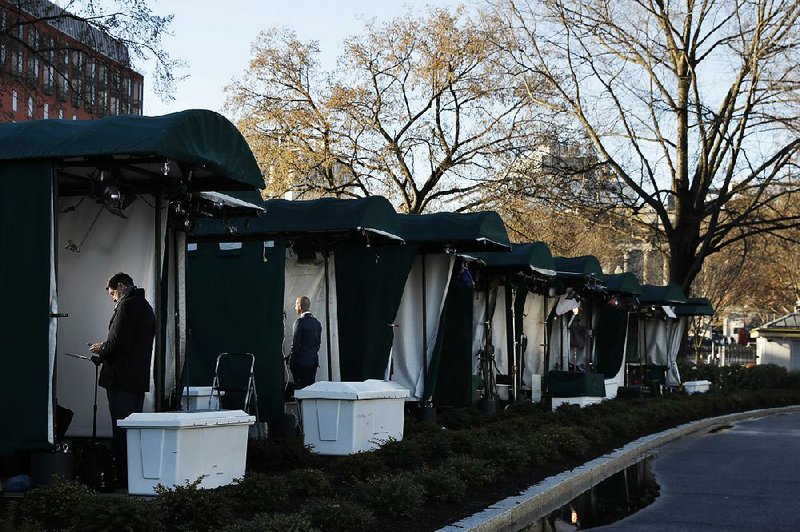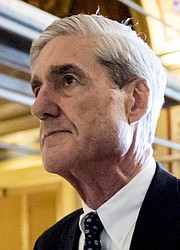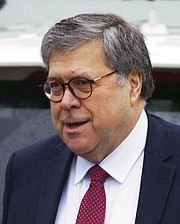WASHINGTON -- Special counsel Robert Mueller has submitted a confidential report to Attorney General William Barr, marking the end of his investigation into Russian interference in the 2016 election and possible obstruction of justice by President Donald Trump, according to the Justice Department.
The submission of Mueller's report ends his closely watched inquiry -- a case that has led to guilty pleas from former advisers to the president and criminal charges against more than 30 people. A senior Justice Department official said the special counsel has not recommended any further indictments.
Justice Department officials notified Congress on Friday that they had received Mueller's report but did not describe its contents. Barr is expected to summarize the findings for lawmakers in coming days.
In a letter to the leaders of the House and Senate Judiciary committees, Barr wrote that Mueller "has concluded his investigation of Russian interference in the 2016 election and related matters."
Immediately after the news of Mueller's report broke, Democrats demanded that its contents be made public.
House Speaker Nancy Pelosi, D-Calif., and Senate Minority Leader Charles Schumer, D-N.Y., issued a joint statement, saying "it is imperative for Mr. Barr to make the full report public and provide its underlying documentation and findings to Congress. ... The American people have a right to the truth."
Pelosi and Schumer also expressed concern that Trump would try to get a "sneak preview" of the findings.
"The White House must not be allowed to interfere in decisions about what parts of those findings or evidence are made public," they said in a joint statement.
The Democratic chairmen of six House committees also demanded that the Justice Department release "without delay" the full report.
The six chairmen are Jerrold Nadler of Judiciary; Eliot Engel of Foreign Affairs; Elijah Cummings of Oversight and Reform; Adam Schiff of the Intelligence Committee; Maxine Waters of Financial Services; and the Ways and Means Committee's Richard Neal.
The chairmen said since the Justice Department asserts a sitting president can't be indicted, Barr's failure to release evidence of criminal or other misconduct by Trump "would raise serious questions about whether the Department of Justice policy is being used as a pretext for a cover-up of misconduct."
Schiff said his panel will issue subpoenas if Mueller's report -- and its underlying evidence -- are not released to Congress.
He said on CNN that Congress needs to know "and so does the country."
Barr wrote that Mueller submitted a report to him explaining his prosecution decisions. The attorney general told lawmakers he was "reviewing the report and anticipate that I may be in a position to advise you of the Special Counsel's principal conclusions as soon as this weekend."
The attorney general wrote he would consult with Deputy Attorney General Rod Rosenstein and Mueller "to determine what other information from the report can be released to Congress and the public consistent with the law, including the Special Counsel regulations, and the Department's long-standing practices and policies."
Barr said there were no instances in the course of the investigation in which any of Mueller's decisions were vetoed by his superiors at the Justice Department.
"I remain committed to as much transparency as possible, and I will keep you informed as to the status of my review," Barr wrote.
After a week of growing expectation that Mueller's long-awaited report would soon arrive, a security officer from Mueller's office delivered it Friday afternoon to Rosenstein's office at Justice Department headquarters, according to spokesman Kerri Kupec. Within minutes of that delivery, the report was transmitted upstairs to Barr.
One official described the report as "comprehensive," but added that very few people have seen it.
Even with the report's filing, Mueller is expected to retain his role as special counsel for a wind-down period, though it is unclear how long that may last, officials said. A few of his staff members will remain in the office to help shut down the operations.
"The investigation is complete," said Kupec.
White House spokesman Sarah Huckabee Sanders said the next steps "are up to Attorney General Barr, and we look forward to the process taking its course. The White House has not received or been briefed on the Special Counsel's report."
Two of the president's lawyers, Rudy Giuliani and Jay Sekulow, said in a joint statement: "We're pleased that the Office of Special Counsel has delivered its report to the Attorney General pursuant to the regulations. Attorney General Barr will determine the appropriate next steps."

CRIMINAL CHARGES
Mueller's work has led to criminal charges against 34 people, including six former Trump associates and advisers.
Five people close to the president have pleaded guilty: Trump's former campaign chairman, Paul Manafort; former deputy campaign manager Rick Gates; former national security adviser Michael Flynn; former personal attorney Michael Cohen; and former campaign adviser George Papadopoulos.
A sixth, Trump's longtime friend Roger Stone, was indicted in January and accused of lying to Congress. He has pleaded innocent.
More than two dozen of the people charged by Mueller are Russians, and because the United States does not have an extradition treaty with Russia, they are unlikely ever to see the inside of a U.S. courtroom.
None of the Americans charged by Mueller is accused of conspiring with Russia to interfere in the election -- the central question of Mueller's work. Instead, they pleaded guilty to various crimes including lying to the FBI.
The special counsel's investigation began May 17, 2017.
Days earlier, Trump had fired FBI Director James Comey. The purported reason was Comey's handling of the 2016 investigation of former Secretary of State Hillary Clinton, but Trump said in an interview with NBC News shortly after the firing that he was thinking about the Russia inquiry when he decided to remove Comey.
Because FBI directors are appointed to 10-year terms to ensure their political independence, the Comey firing rattled Washington. It set off alarms in the Justice Department and in Congress, where lawmakers feared the president was trying to end the Russia investigation before it was completed.
After then-Attorney General Jeff Sessions recused from the Russia investigation, Rosenstein chose Mueller as special counsel.
While it had been publicly known since the summer of 2016 that the FBI was investigating Russian attempts to interfere with the presidential campaign, officials had largely kept quiet that there was also an investigation, starting that July, to see if Trump campaign advisers might be conspiring with the Russians.
After Trump won the election, that investigation came into public view.
By late 2016 and early 2017, the FBI was investigating whether anyone close to Trump had helped Russia in those efforts, even as Trump was sworn in to office and began filling senior government positions.
Just days into the new administration, FBI agents interviewed Flynn at the White House, questioning him about his conversations during the transition with Sergey Kislyak, then Russia's ambassador to the United States. Flynn was forced out of the job a month later over accusations he had misled senior administration officials about those conversations.
The Mueller investigation pursued a number of investigative tracks, including whether the president's behavior leading up to and after the firing of Comey amounted to an attempt to obstruct justice.
Throughout 2017, Mueller's team, working out of an office building in Washington, pursued Manafort over his finances. That case also was inherited from work done previously by the Justice Department and the FBI, but under Mueller it gained new life. In October 2017, Manafort and Gates, his right-hand man, were charged with a host of financial crimes.
Two months later, Flynn pleaded guilty to lying to the FBI.
Republican political opposition to Mueller's work also grew, encouraged in part by the president's repeated declarations that the investigation was a "witch hunt."

Within a day of Flynn's plea, The Washington Post reported that the former lead FBI agent on Mueller's team, Peter Strzok, had been removed from that position over anti-Trump text messages he had exchanged with a senior FBI lawyer, Lisa Page. Both had worked on the Clinton investigation, and their texts to each other during the campaign revealed disdain for Trump.
The texts, Justice Department officials insisted, had not compromised the Russia investigation, but they fueled a political counterattack by Republicans loyal to the president who said the FBI's handling of the Clinton and Trump matters showed the agency's leadership was letting a political agenda influence the inquiry.
As the investigation pushed into its second year, it took direct aim at Moscow. In February 2018, 13 Russians were charged as part of an online "troll farm" accused of sowing political division and distrust among Americans on social media. Five months later, Mueller's office indicted a dozen Russian military intelligence officials, saying they conspired to hack into Democrats' computer accounts and publicize the stolen files.
In August 2018, Mueller's team won a conviction of Manafort in a Virginia courthouse at the same time Cohen, Trump's former lawyer, was pleading guilty as part of a deal with federal prosecutors in New York. Cohen eventually pleaded guilty twice, and at his sentencing, he blamed Trump for his downfall.
In January, Mueller's team accused Stone of obstructing the special counsel's efforts and lying to Congress about his efforts in 2016 to learn when potentially damaging emails from Clinton's presidential campaign would be released by the anti-secrecy group WikiLeaks.
Information for this article was contributed by Devlin Barrett, Matt Zapotosky and Josh Dawsey of The Washington Post; and by Eric Tucker, Michael Balsamo, Chad Day and staff members of The Associated Press.
A Section on 03/23/2019


